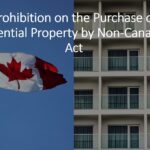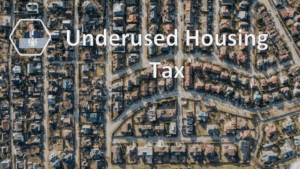MBB LAW INSIGHTS SERIES - REAL ESTATE
Underused Housing Tax
Background
The Underused Housing Tax Act imposes an annual 1% underused housing tax (UHT) on the value of vacant and underused residential properties owned directly or indirectly by those who are not Canadian citizen or a permanent resident of Canada. It became effective on January 1, 2022, and the first tax return for the year-end December 31, 2022 is due on April 30, 2023.
Mandatory Declaration by Non-Canadian Residential Property Owners
Every owner of a residential property, other than an “excluded owner”, must file an annual declaration with the Canada Revenue Agency (CRA) for each residential property owned.
“Excluded Owners”
An “excluded owner” is not subject to the UHT. Excluded owners include the following, as of December 31:
- Canadian citizens and permanent residents of Canada;
- Corporations listed on a Canadian stock exchange;
- Registered charities;
- Cooperative housing corporations;
- Indigenous governing bodies or corporations owned by Indigenous governing bodies;
- Municipalities or corporations owned by municipalities;
- Government of Canada or an agent of the Government of Canada; and
- Universities, public colleges, school authorities, hospital authorities.
Private corporations, partnerships, and trusts are not excluded owners and, therefore, are subject to filing an annual UHT declaration if they own a residential property, even if there is no UHT owing.
Residential Properties Located in Canada Subject to the UHT
The UHT applies to every legal owner of “residential properties” located in Canada unless the owners are excluded owners or if an exemption applies.
“Residential properties” include:
- Detached homes;
- Detached homes with up to three units (e.g., duplex, triplex);
- Semi-detached homes;
- Row houses; and
- Condominiums.
Exemptions
If an owner is not an excluded owner, the residential property owned may be exempt from the UHT. These exemptions include:
| Primary Place of Residence |
|
| Qualifying Occupancy |
|
| Specified Canadian corporation |
|
| Partner of specified Canadian partnership |
|
Trustee of specified Canadian trust
|
|
| Uninhabitable property |
|
| Ongoing renovations |
|
| Acquisition of interest |
|
| Deceased owner and other owner |
|
| Newly constructed property |
|
Owners who do not qualify as excluded owners must file a UHT declaration if they own a residential property and claim the exemption, even if no UHT is payable.
How Much Is the UHT?
The UHT is 1% of the home’s taxable value or 1% of its most recent sale price, whichever is greater. Owners can also file an election between January 1 and April 30 of the following calendar year to use the property’s fair market value to determine the owing UHT and if they can obtain an appraisal.
If two or more individuals hold title to a property, each owner will be responsible for the UHT based on their ownership interest.
Failure to File Declarations
If an owner fails to file a declaration in respect of a residential property for a calendar year, the owner would not be entitled to the exemptions.
When assessing the owner for UHT and penalties, the CRA would have the discretion to use the fair market value of the property at the time an assessment is issued in calculating the amounts owing.
Failure by an owner to file a declaration in respect of a property for a calendar year could also result in significant consequences for the owner, as well as penalties and interest.
For further details, please contact us.
More Articles:
 Prohibition on the Purchase of Residential Property by Non-Canadians ActIn Insights, Real Estate
Prohibition on the Purchase of Residential Property by Non-Canadians ActIn Insights, Real Estate Toronto Vacant Home TaxIn Insights, Real Estate
Toronto Vacant Home TaxIn Insights, Real Estate

